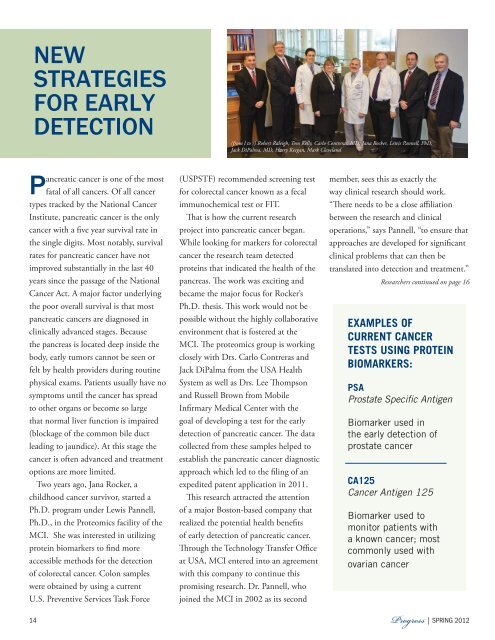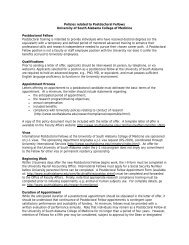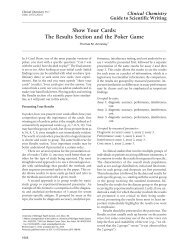NEWSTRATEGIESFOR EARLYDETECTION(from l to r) Robert Raleigh, Tom Kelly, Carlo Contreras, MD, Jana Rocker, Lewis Pannell, PhD,Jack DiPalma, MD, Harry Keegan, Mark ClevelandPancreatic cancer is one <strong>of</strong> the mostfatal <strong>of</strong> all cancers. Of all cancertypes tracked by the National CancerInstitute, pancreatic cancer is the onlycancer with a five year survival rate inthe single digits. Most notably, survivalrates for pancreatic cancer have notimproved substantially in the last 40years since the passage <strong>of</strong> the NationalCancer Act. A major factor underlyingthe poor overall survival is that mostpancreatic cancers are diagnosed inclinically advanced stages. Becausethe pancreas is located deep inside thebody, early tumors cannot be seen orfelt by health providers during routinephysical exams. Patients usually have nosymptoms until the cancer has spreadto other organs or become so largethat normal liver function is impaired(blockage <strong>of</strong> the common bile ductleading to jaundice). At this stage thecancer is <strong>of</strong>ten advanced and treatmentoptions are more limited.Two years ago, Jana Rocker, achildhood cancer survivor, started aPh.D. program under Lewis Pannell,Ph.D., in the Proteomics facility <strong>of</strong> theMCI. She was interested in utilizingprotein biomarkers to find moreaccessible methods for the detection<strong>of</strong> colorectal cancer. Colon sampleswere obtained by using a currentU.S. Preventive Services Task Force(USPSTF) recommended screening testfor colorectal cancer known as a fecalimmunochemical test or FIT.That is how the current researchproject into pancreatic cancer began.While looking for markers for colorectalcancer the research team detectedproteins that indicated the health <strong>of</strong> thepancreas. The work was exciting andbecame the major focus for Rocker’sPh.D. thesis. This work would not bepossible without the highly collaborativeenvironment that is fostered at theMCI. The proteomics group is workingclosely with Drs. Carlo Contreras andJack DiPalma from the USA HealthSystem as well as Drs. Lee Thompsonand Russell Brown from MobileInfirmary Medical Center with thegoal <strong>of</strong> developing a test for the earlydetection <strong>of</strong> pancreatic cancer. The datacollected from these samples helped toestablish the pancreatic cancer diagnosticapproach which led to the filing <strong>of</strong> anexpedited patent application in 2011.This research attracted the attention<strong>of</strong> a major Boston-based company thatrealized the potential health benefits<strong>of</strong> early detection <strong>of</strong> pancreatic cancer.Through the Technology Transfer Officeat USA, MCI entered into an agreementwith this company to continue thispromising research. Dr. Pannell, whojoined the MCI in 2002 as its secondmember, sees this as exactly theway clinical research should work.“There needs to be a close affiliationbetween the research and clinicaloperations,” says Pannell, “to ensure thatapproaches are developed for significantclinical problems that can then betranslated into detection and treatment.”Researchers continued on page 16Examples <strong>of</strong>Current CancerTests Using ProteinBiomarkers:PSAProstate Specific AntigenBiomarker used inthe early detection <strong>of</strong>prostate cancerCA125Cancer Antigen 125Biomarker used tomonitor patients witha known cancer; mostcommonly used withovarian cancer14 <strong>Progress</strong> | SPRING <strong>2012</strong>
mobile mayor presents city key to mci visitorLast December the, USA Mitchell CancerInstitute hosted Dr. Bart Barlogie, director <strong>of</strong>the <strong>University</strong> <strong>of</strong> Arkansas for Medical SciencesMyeloma Institute for Research and Therapy(UAMS). During his visit, Barlogie delivereda Distinguished Scientist Seminar Program,entitled “Challenges <strong>of</strong> Myeloma Diagnosisand Therapy from the Arkansas Perspective.”While visiting he met with MCI physiciansand scientists, and was presented a key to theCity <strong>of</strong> Mobile by Mayor Sam Jones. His visitwas particularly meaningful to Mayor Jones asDr. Barlogie is his physician, directing hiscancer care.On the faculty at UAMS since 1989,Barlogie has built the largest center in theworld devoted exclusively to clinical care andresearch in multiple myeloma. MCI is pleasedto bring distinguished scientists to Mobile todevelop collegial and collaborative relationshipswith our physicians and scientists.President Moulton, Dr. Barlogie andMayor Sam JonesDr. Rod Rocconitapped for a new roleIn addition to his role as Associate Pr<strong>of</strong>essor <strong>of</strong> Interdisciplinary Clinical Oncology, Dr. Rodney P. Rocconihas been appointed Deputy Associate Director for Clinical Research. In this role, Rocconi serves as thephysician-leader and advocate for the Institute’s growing clinical trials portfolio. Rocconi is uniquelyqualified for this role; as a physician-scientist at the MCI, he maintains a thriving gynecologic oncologypractice as well as a basic research laboratory program. “As an academic cancer center, our goals includeproviding state-<strong>of</strong>-the-art advancements in cancer treatment and playing a key role in advancing thescience <strong>of</strong> cancer therapy. With this mission, we provide a ‘bench to bedside’ approach in developingtreatment plans for our patients. I look forward to expanding our clinical trials portfolio as we continue to<strong>of</strong>fer the latest cancer therapies to our region,” says Rocconi.For the Community,Knowledge is HealthThe Mitchell Cancer Institute was proud topartner with the <strong>Alabama</strong> Department <strong>of</strong> PublicHealth during June and July <strong>of</strong> 2011 to promoteawareness <strong>of</strong> the need for education aboutprostate cancer, providing information on signsand symptoms and supporting the role <strong>of</strong> theindividual in informed decision making. Theawareness campaign included partnering withthe Mobile Bay Bears for the Ed Randall “Bat forthe Cure” baseball event and it also included freescreenings <strong>of</strong>fered by Drs. Eddie Reed and RogerOve to the public on 6 consecutive Fridays hereat the Mitchell Cancer Institute. Participants werecitizens age 40-75 who resided in Mobile, Baldwinor Washington Counties. Education was providedduring the intake process by MCI PatientNavigators, Cathy Tinnea and Dennis King. Atotal <strong>of</strong> 118 men were screened. Of those menscreened, 42 were found to have abnormalitiesthat required counseling or clinical interventionand 4 were found to have cancers. While screeningfor prostate cancer remains a topic frequently inthe news, the need for informed decision makingand awareness <strong>of</strong> each individual’s risk factors arecrucial components <strong>of</strong> comprehensive cancer carethat the Mitchell Cancer Institute provides.Prostate screenings will be <strong>of</strong>fered again in Juneand July <strong>2012</strong>. To schedule an appointment call251-445-8428.Dr. Eddie ReedONCOLOGYOUTLOOK<strong>2012</strong>March 16-17th, marked the third year that the USA Mitchell Cancer Institute hassponsored Oncology Outlook, a continuing medical education event held at one <strong>of</strong> ourlocal treasures, the beautiful Marriott Grand Hotel Golf Club & Spa in Point Clear, AL.The goal <strong>of</strong> the conference is to <strong>of</strong>fer timely updates on the latest treatments and emergingtechnologies in cancer care, as well as provide a relaxed atmosphere in which regionalphysicians and other healthcare providers can interact, discuss the delivery <strong>of</strong> care andshare ideas, which ultimately improves patient outcomes. This year’s conference focused onwomen’s cancers and was co-directed by MCI gynecologic oncologists Drs. Rodney Rocconiand Michael Finan. For more information visit usa-cme.com or contact Susan Crutchfieldat 251-445-9829 or scrutchfield@usouthal.edu. Oncology Outlook 2013 will be held onMarch 15 and 16, 2013.<strong>Progress</strong> | SPRING <strong>2012</strong> 15











